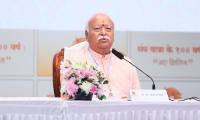Describing the just-concluded India visit of Prime Minister Khaleda Zia as a 'turning point' in bilateral ties, Bangladesh on Thursday said it infused a renewed spirit for strengthening cooperation between the two sides to address issues of common concern.
"Begum Zia's visit was characterised as a testimony to the highest priority attached by both sides to the promotion of their bilateral relations in all aspects," Bangladesh Foreign Secretary Hemayetuddin told reporters in Dhaka.
Responding to questions, he said, a meeting of the Joint Rivers Commission will be held soon and the Indian Minister for Water Resources will visit Bangladesh. The Joint Economic Commission meeting will also be held shortly to devise ways and means to narrow the wide trade gap between the two countries, he said.
The two prime ministers, he said, directed the JEC, Joint Working Group and Joint Boundary Working Group to meet at the earliest to revive discussions on all outstanding issues.
Replying to a question on border clashes between the two countries, he said frequent Home Secretary-level meetings will be held to reduce such tensions. Both sides, he said, expressed concern over security matters, adding that the Indian side praised the Bangladesh government's tough steps against militants.
Zia returned home late last night after a three-day visit to India.
Regarding the deepening of connectivity between the two countries, Hemayetudin said the two prime ministers discussed ways and means for upgrading the facilities on both sides. He said they discussed each other's security concerns and expressed their firm commitment to deal with all forms of violence, and renewed their firm resolve not to allow each other's territory for use by forces inimical to the other.
Zia stressed the 'urgent need' for expeditious conclusion of the water-sharing agreement relating to dry season flows of the river Teesta, he said, adding that the premier also emphasised for protecting the flow of waters in the common rivers referring to India's commitment as per the Ganges Water Sharing Treaty of 1996.
On the transit issue, he told a questioner that river transit has always been there and the introduction of Sialdaha-Joydebpur train service would be examined.
On the objective of the 'goodwill visit,' the diplomat said, "It was to promote forward momentum in our relations. Both sides engaged in constructive engagement for incremental advancement and identifying the elements of confidence building measures for better understanding of each other."
Hemayetuddin said the manifestation of the goodwill generated during the visit resulted in the signing of two bilateral agreements - the revised Agreement on Trade and the Mutual Cooperation for Preventing Illicit Trafficking in Narcotic drugs and psychotropic substances.
The Bangladesh foreign secretary said the two prime ministers underscored the need for continuous engagement between the two countries at all levels and stressed the need for institutionalisation of these engagements.
Hemayetuddin said the two sides agreed to intensify efforts for early resolution of the unresolved issues relating to the full implementation of the Indo-Bangladesh Boundary Agreement of 1974. Zia also invited her Indian counterpart Manmohan Singh to visit Bangladesh, which he accepted.
New Delhi, he said, responded positively to Dhaka's request on the need for opening a Bangladesh Trade Office in Guwahati. The Bangladesh side, he said, also sought movement of goods from Nepal and Bhutan through Indian territory into Bangladesh, to which New Delhi had agreed many years back.








